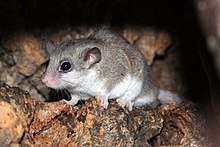Glires
Glires (Latin glīrēs, dormice) is a clade (sometimes ranked as a grandorder) consisting of rodents and lagomorphs (rabbits, hares, and pikas). The hypothesis that these form a monophyletic group has been long debated based on morphological evidence. Two morphological studies, published in 2001[1] and 2003,[2] strongly support the monophyly of Glires. In particular, the 2003 study reported the discovery of fossil material of basal members of Glires, particularly the genera Mimotona, Gomphos, Heomys, Matutinia, Rhombomylus, and Sinomylus. Their description, in 2005,[3] helped to bridge the gap between more typical rodents and lagomorphs.[2] Data published in 2001,[4][5] based on nuclear DNA, supported Glires as a sister of Euarchonta to form Euarchontoglires, but some genetic data from both nuclear and mitochondrial DNA have been less supportive.[6] A study, published in 2007,[7] investigating retrotransposon presence/absence data unambiguously supports the Glires hypothesis. Studies published in 2011[8] and 2015[9] place Scandentia as a sister clade of the Glires, invalidating Euarchonta as a clade.
| Euarchontoglires |
| |||||||||||||||||||||||||||
| Glires | |
|---|---|
 | |
| Dormouse (Gliridae) | |
| Scientific classification | |
| Kingdom: | Animalia |
| Phylum: | Chordata |
| Class: | Mammalia |
| Clade: | Exafroplacentalia |
| Magnorder: | Boreoeutheria |
| Superorder: | Euarchontoglires |
| (unranked): | Glires Linnaeus, 1758 |
| Orders | |
References
- Meng & Wyss 2001.
- Meng 2003.
- Asher 2005.
- Murphy 2001.
- Madsen 2001.
- Arnason 2002.
- Kriegs 2007.
- Meredith, Robert W.; Janečka, Jan E.; Gatesy, John; Ryder, Oliver A.; Fisher, Colleen A.; Teeling, Emma C.; Goodbla, Alisha; Eizirik, Eduardo; Simão, Taiz L. L. (2011-10-28). "Impacts of the Cretaceous Terrestrial Revolution and KPg Extinction on Mammal Diversification". Science. 334 (6055): 521–524. doi:10.1126/science.1211028. ISSN 0036-8075. PMID 21940861.
- Zhou, Xuming; Sun, Fengming; Xu, Shixia; Yang, Guang; Li, Ming (2015-03-01). "The position of tree shrews in the mammalian tree: Comparing multi-gene analyses with phylogenomic results leaves monophyly of Euarchonta doubtful". Integrative Zoology. 10 (2): 186–198. doi:10.1111/1749-4877.12116. ISSN 1749-4877. PMID 25311886.
- Asher RJ, Meng J, Wible JR, et al. (February 2005). "Stem Lagomorpha and the antiquity of Glires". Science. 307 (5712): 1091–4. doi:10.1126/science.1107808. PMID 15718468.
- Madsen O, Scally M, Douady CJ, et al. (February 2001). "Parallel adaptive radiations in two major clades of placental mammals". Nature. 409 (6820): 610–4. doi:10.1038/35054544. PMID 11214318.
- Meng J, Hu Y, Li C (2003). "The osteology of Rhombomylus (Mammalia, Glires): implications for phylogeny and evolution of Glires". Bulletin of the American Museum of Natural History. 275: 1–247. doi:10.1206/0003-0090(2003)275<0001:TOORMG>2.0.CO;2. hdl:2246/442.
- Meng J, Wyss AR (2001). "The morphology of Tribosphenomys (Rodentiaformes, Mammalia): phylogenetic implications for basal Glires". Journal of Mammalian Evolution. 8 (1): 1–71. doi:10.1023/A:1011328616715.
- Murphy WJ, Eizirik E, Johnson WE, Zhang YP, Ryder OA, O'Brien SJ (February 2001). "Molecular phylogenetics and the origins of placental mammals". Nature. 409 (6820): 614–8. doi:10.1038/35054550. PMID 11214319.
- Arnason U, Adegoke JA, Bodin K, et al. (June 2002). "Mammalian mitogenomic relationships and the root of the eutherian tree". Proceedings of the National Academy of Sciences of the United States of America. 99 (12): 8151–6. doi:10.1073/pnas.102164299. PMC 123036. PMID 12034869.
- Kriegs JO, Churakov G, Jurka J, Brosius J, Schmitz J (April 2007). "Evolutionary history of 7SL RNA-derived SINEs in Supraprimates". Trends in Genetics. 23 (4): 158–61. doi:10.1016/j.tig.2007.02.002. PMID 17307271.